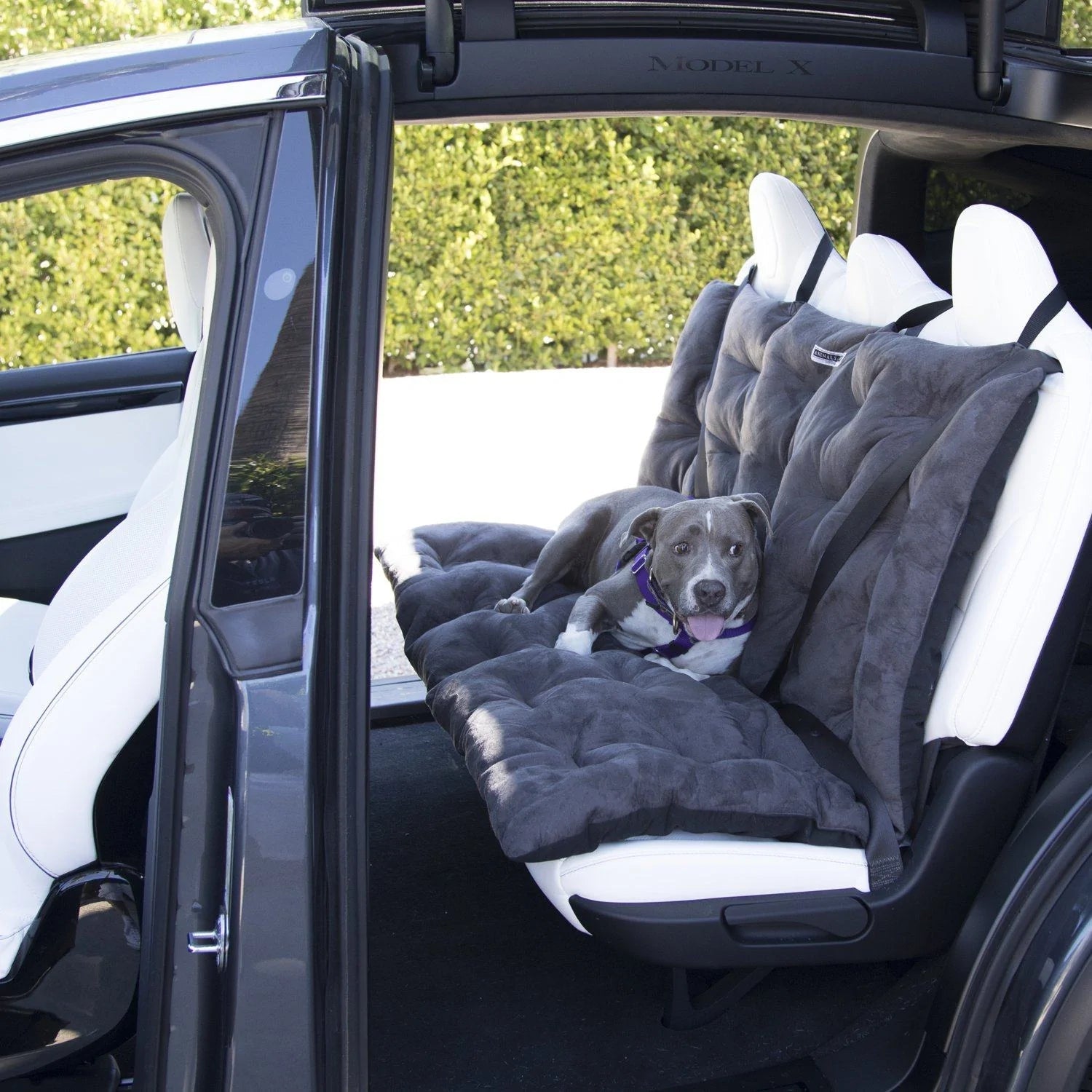Dog Carsickness: Do Dogs Actually Get Carsick?

Many people get carsick, so it's probably not surprising that our closest four-legged companions can, too. Unfortunately, dog carsickness is just as miserable for our beloved pets as regular carsickness is for us. Here are some facts about carsickness in dogs so you'll be better prepared to help your poor pooch when they have to hit the road.
Why Dogs Get Carsick
According to the American Kennel Club (AKC), carsickness in dogs can be caused by a physical issue or psychological trauma. To make things even worse for your poor pup, one can sometimes trigger the other!
The Most Common Causes of Dog Carsickness:
- Vertebral structures in the inner ear are necessary for balance. In puppies, those structures aren't fully developed yet, and the resulting balance issues can trigger nausea and vomiting.
- Remembering all of that nausea and vomiting can make your pup uneasy in the car even after they no longer have balance issues. That uneasiness can trigger more nausea and vomiting, which makes the uneasiness worse. Pretty soon, your poor dog starts to feel carsick at even the mention of a car ride.
- Associating a ride in the car with traumatic events like being separated from their mother and littermates or a painful trip to the vet can trigger car anxiety, stress, and nausea. It's a short step from there to ongoing dog carsickness issues.
Symptoms of Dog Carsickness
According to Innovet and WebMD's Fetch blog, these are some of the symptoms dogs may suffer from motion sickness. Your particular dog may experience some or all of them.
- Listlessness or unusual inactivity
- Obvious uneasiness
- Crying, whining, or whimpering
- Trembling or shivering
- Frequent yawning
- Smacking or licking their lips
- Excessive drooling
- Dry heaving Vomiting
How to Prevent Carsickness in Dogs
Lowering your dog's anxiety level often leads to less nausea and a happier dog and car owner. Soothe your dog with a favorite dog blanket and toy from home. Even a comfy t-shirt you've worn recently can provide a sense of comfort when your dog cuddles up with it. Also, an extra-special toy or yummy treat they only get in the car can make the prospect of a ride more enticing.
Provide for your dog's comfort and sense of security in the car, and then they're less likely to suffer from dog carsickness. Here are some more tips:
- Keep the interior of the car cool and well-ventilated.
- Cracking the car windows a couple of inches will equalize the air pressure, preventing ear pain and providing fresh air to help calm a sick stomach.
- Give your dog plenty of fresh water in a travel-friendly water bowl, but limit your dog's food for 12 hours before the ride to avoid nausea. Even older dogs who have weathered many car trips do better when traveling on an empty stomach.
- A familiar crate with a comfy pad and cover will let your dog avoid the disconcerting sensation of the world rushing by that can trigger carsickness.
- Using a dog seat belt to buckle your pet into the middle seat in the back will limit their movement and encourage them to face forward. It's the view out of the side windows that's most likely to cause dog carsickness.
- Small dogs may benefit from the cozy comfort of a dog car seat that keeps them secure while still letting them see what's going on around them.
Acclimating your dog to car rides
Always start by just getting your leashed dog comfortable sitting in a non-moving car with the doors open. Once your dog can handle sitting in the car with the doors closed, try letting the car idle. Don't go anywhere yet! You just want your dog to feel safe with the engine running.
Then begin making short trips, maybe just down the driveway and back. Once your pooch is okay with that, try taking them for a car ride around the block. You can gradually expand the distance as they become more comfortable during their car rides. You want them to develop positive associations (like going to the dog park!) with riding in a car.
Does Your Dog Need Dog Carsickness Medication?
If the mere idea of a road trip triggers anxiety in you and your pet, it may be time for some medical intervention. Your vet will want to rule out a physical problem like a possible ear infection, especially if your adult dog has suddenly developed motion sickness. Your doctor of veterinary medicine (or DVM) may then suggest over-the-counter supplements or natural remedies that can help. If all else fails, they'll probably prescribe dog motion sickness or anti-nausea medications.
Over-the-Counter Treatments
The vets behind Fetch suggest giving your pet a sugary treat before starting out. The sugar seems to calm those queasy feelings. A jelly bean is okay, but avoid anything with toxic xylitol or chocolate. A ginger snap packs a double nausea-fighting whammy with both sugar and stomach-calming ginger.
Antihistamines like Dramamine or dimenhydrinate reduce drooling, calm dog motion sickness symptoms, and provide mild sedation. Just be sure to consult with your vet for the proper dosage before giving any over-the-counter medications to your dog.
Mother dogs comfort their puppies with pheromones that calm the puppies and reduce their stress levels. Adaptil incorporates these natural pheromones into collars that let you take the soothing scent on the road.
Prescription Medications
The anti-nausea drug cerenia (maropitant citrate) can help prevent acute nausea, vomiting, and dehydration. Your vet may also provide a sedative before a long trip to keep your pet as comfortable as possible. Anti-anxiety medicine may help, too.
Are you searching for great products to help your dog enjoy life more — even on the road? Then give us a call here at Animals Matter. We're all about improving the lives of our customer's best friends!
FAQs
How often should you take a dog for a car ride?
Believe it or not, your pooch may grow to love car travel and not be able to get enough of it! In that case, you can take them along for the ride whenever you'd like. Just make sure you offer them plenty of breaks during long drives.
Can car rides make dogs sick?
Yes, if they're a young puppy or have:
- Past unhappy experiences in a car
- Certain medical problems (like an ear infection)
- A history of being sick
What should you do if your dog is showing signs of carsickness?
Pulling over and letting them out of the car for even a few minutes should help. So will plenty of fresh air once you get back in the car. A change in position within the car might help, too.
Subscribe
Sign up to get the latest on sales, new releases and more…
Categories
- Best Places to Take Your Dog on Vacation this 2026(USA Edition)
- Tails of Celebration: Working Dogs of the Lares Trek, A Silent Partnership In Peru
- 5 Easy Organic Christmas Recipes for Dogs: Simple Holiday Treats Your Companion Will Love
- The 6 Best Luxury Gifts for Your Dog This Christmas: Thoughtful Holiday Comfort That Truly Lasts
- Why Playtime Matters: The Benefits of Mental Stimulation and Playtime with Your Companion
- Tails of Celebration: The Miao Dog-Carrying Festival - A Hero's Honor in China
- A Dog-Friendly Thanksgiving 2025: Comfort, Calm, and Easy Treat Recipes
- The Best Dog Beds for Winter 2025: 5 Luxury Styles for Warmth, Comfort & Orthopedic Support
- Tails of Celebration: The Feast of Saint Hubert — Belgium's Timeless Blessing
- Halloween Safety Tips for Dogs: How to Keep Your Companion Safe This Spooky season
- Tails of Celebration: Día de los Muertos / Day of the Dead for Pets, A Festival of Memory in Mexico
- How to Care for Senior Dogs in Fall: Mobility Tips & Joint Support
- Tails of Celebration: Kukur Tihar & The Tihar Festival of Nepal
- What is a VDI Testing for dogs ? : Insights, Procedures and Preventive Measures
- Cheap Dog Beds vs. Luxury Dog Beds: The Real Cost of a $50 "Disposable" Dog Bed
- Can Dogs Have OCD? Understanding Canine Compulsive Behaviors (CCD)
- Does My Dog Like Music? Find Out What Tunes Make Your Pup Wag!
- Effective Solutions for Food Aggression in Dogs
- 7 Frozen Treats Your Dog Will Love This Summer☀️🧊🍉
- The Best Waterproof Liners for Dog Beds: Protect Against Spills, Drool, and Accidents
- How to Cope with the Loss of a Dog: A Tribute to Every Companion We Carry in Our Hearts
- Top Tips on How to Prevent Matting in Dogs
- Understanding and Managing Dogs with Hip Dysplasia
- The Ultimate Guide to Dog Gut Health: Natural Remedies, Probiotic Insights and Signs of Poor Gut Health
- The Best Supplements for Dogs: Explore Top Picks for Canine Health and Wellness
- How Often Should I Brush My Dog's Teeth? Tips for Optimal Canine Dental Health
- Ultimate Guide on How to Comfort Your Dog During Fireworks this 4th of July
- Managing a Blowing Coat: Essential Grooming Tips for Double-Coated Dogs.
- 5 Daily Habits That Boost Your Dog’s Long-Term Wellness
- Mastering Crate Training a Dog: Tips and Benefits
- Dog Car Seats vs. Seat Covers: What’s The Best Option For Your Companion?
- Best Outdoor Dog Beds: Luxury, Durability, and Unmatched Comfort
- Is My Dog Overweight? Tips to Assess and Help Your Companion
- The Best Faux Fur Dog Beds for Ultimate Pet Comfort of 2025
- Dog Running Guide: How to Start, Train & Stay Safe when running with your Dog
- Indestructible Dog Beds? The Truth Behind the Term
- Top Tips for Effective Exercise for Dogs
- Effective Dog Ear Cleaning: A Step-by-Step Guide for Maintaining Healthy Ears
- How to Manage Dog Aggressive Behaviors: Expert Tips and Advice
- Effective Canine Ear Infection Remedies: Symptoms, Causes & Treatments
- How to Make a New Dog Comfortable in Their New Home - 2025 Guide
- Signs of Dog Allergy Symptoms and How to Help and Prevent Them
- Why Does My Dog Lick Their Paws? Causes and Solutions Explained
- Dog Alzheimer's: Symptoms, Causes, and Treatment Options
- The Legacy of Comfort with the Iconic Animals Matter® Ortho Companion-Pedic® Puff Luxury Dog Bed
- Orthopedic Square Dog Beds: The Ultimate Blend of Luxury, Comfort, and Support
- Loungers: The Ultimate Beds for Luxury, Comfort, and Orthopedic Support
- Square Dog Beds: Orthopedic Comfort and Stylish Designs for Your Companion
- Effective Solutions for Canine Incontinence: Identifying Causes and Best Treatments
- Ethical, Sustainable, and Certified: Why Certified Products Matter, Exploring CA Prop 65 and CertiPUR-US® Standards


Leave a comment
Please note, comments must be approved before they are published